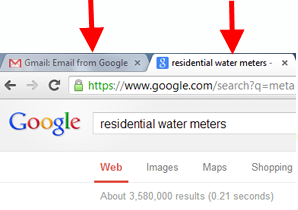Consultant at Steckler eMarketing, Watertown MA 02472
In SEO Chat’s online forum I often see posts asking the community what to do to improve their search rankings. Community members invariably respond with — Hire an SEO consultant. There is just too much skill and training involved to provide a complete answer in a sinple forum response. For those who are just getting oriented to SEO, Charles Benisch gives the following introduction.
Search Queries
Search Queries are collections of search terms, referred to as keywords, that are processed by search engines. The query will prompt a list of webpage responses based on each webpage’s relevancy to the terms used in the search (the keywords).
Here, I have performed a search query for the keywords “residential water meters.”
Keywords and Meta Keywords
Keywords are the terms that best describe a webpage. The selection of keywords is integral to a cohesive and effective SEO strategy. Keywords should be selected based on their natural descriptiveness of a webpage and search frequency.
For instance, WM Series is a product name. The WM Series, however, is also a water meter. It is a residential and commercial water meter. It is a mechanical water meter. It is a bronze water meter. It is a water sub-meter. It can be a pulse output water meter. It is an impeller meter. It is a low flow water meter. It can be described many ways!
How should we decide what keywords best describe the WM Series webpage?
We should select keywords that best describe the webpage and are searched for most frequently by web users. How do we know which keywords are searched for most frequently? We ask Google!
The Keyword Tool in Google Adwords is a pretty amazing tool where we can provide Google with a series of search terms and Google will provide us with their search frequency. Moreover, Google recommends search terms that it thinks are related to those that we initially provided.
Another handy and popular tool for researching keywords is Wordtracker.
The following table includes the search frequency of the keywords highlighted in the preceding paragraphs.
| Keyword | Searches per Month |
| water meter | 246,000 |
| residential water meter | 1,000 |
| commercial water meter | 320 |
| mechanical water meter | 390 |
| WM Series | 1,600 |
We can see from the search frequency results that water meter is clearly the most searched for term. We also see that the second most searched for term is “WM Series.” This can be misleading.
After searching for WM Series in Google, many different webpages are prompted covering many different topics, including “WM Series (wood/metal)” Webber BBQ grills, Wellmate WM Series captive air tanks, WM Series Wall Mount open frame racks, WM Series Rack Mount Cable Managers, etc.
People who are searching for the terms “WM Series” are not clearly looking for water meters.
So why not make all webpages use the most searched for keywords?
SEO is about being where the searchers are. A web marketer should select the broad, highly searched for keywords for selection charts where many products are featured. This way all the products that pertain to a search query are listed. The marketer should also select more nuanced and savvy keywords for second-tier selection charts and product pages. For instance, web users looking searching for “digital water meters” should be provided a digital water meters page. Web users searching for “low flow water meters” should be provided a web page offering either one or several low flow water meters.
Meta Keywords
Meta Keywords are crafted by the selection of keywords for page optimization. They should include about 3 – 7 keywords that have high search frequencies, are relevant to the subject matter of the page, are actually included in the page’s content. For example, If you choose “rotameter” for a keyword, the term “rotameter” should appear in the webpage.
Page Titles
The Page Title is an HTML element that helps both users and search engines identify the main topic of a webpage. This meta-element holds a significant amount of SEO weight, and it should be crafted with consideration.
The Page Title has two limitations of characters: what will display on the page tab, and what will display in the search engine’s search results page.
The text that will display on the page tab is limited to 25 characters, and these first 25 characters hold the most amount of SEO weight.
Web marketers should utilize the keywords selected for webpage optimization in the first 25 characters of the Title Tag.
Using terms like product names in the first 25 characters should be avoided. Instead, use the keywords that best characterize the webpage or product.
The number of characters that will display in the search engine’s search results page is limited to 70.
It might be more appropriate to include Product Names (WM Series) or company names here; however, this search engine real estate might best be used to further describe the page/product and lure web users.
Meta Description Tags
The Meta Description is the descriptive snippet that appears below the Page Title in the Search Engine’s search results page.
The Meta Description does not hold very much SEO weight, but it is still a very significant aspect of Search Engine Marketing. The Meta Description is the argument that the website owners can use to attract a web user to their site. The Meta Description offers the web marketer the opportunity to make their case, so to speak, about the relevancy of their website.
Terms from the search query will appear bold in the Meta Description – so it is important to include keywords that have high search frequencies.
The Meta Description has a character limit of 160 characters for most search engines, but the description is often truncated to 140 characters.
 |
| Terms from the Search Query are bolded |
Warning Regarding Keyword Stuffing
Keyword Stuffing is an SEO technique used by Web designers to overload keywords onto a Web page so that search engines will read the page as being relevant in a Web search. Because search engines scan Web pages for the words that are entered into the search criteria by the user, the more times a keyword appears on the Web page the more relevancy the search engine will assign to the page in the search results (this is only one way that search engines determine relevancy, however.) Search engines often penalize a site if the engine discovers keyword stuffing, as this practice is considered poor netiquette, and some search engines will even ban the offending Web pages from their search results.
Therefore, it is important to be selective when selecting keywords/title tags, etc. The more terms are stuffed into these areas, the less powerful – and potentially more harmful – they become.
Jean Steckler
Steckler eMarketing
www.Steckler-eMarketing.com
jean@steckler-emarketing.com








Recent Comments